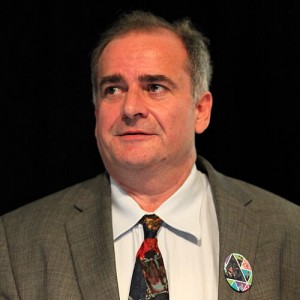
Caspar Bowden, one of the most remarkable people I’ve been lucky to know, has died. His Wikipedia entry summarises his remarkable, highly-principled life and his accomplishments. I first met him in 1999 when campaigning against the Regulation of Investigatory Powers bill which was then on its way through a clueless UK parliament.
He was an extraordinarily serious man in whose company, I always felt slightly frivolous by comparison. But his seriousness derived from a deeply perceptive and informed concern about the scale of the surveillance nightmare into which we were sleepwalking — a concern that was amply corroborated by the Snowden revelations.
Caspar and I were both speakers at the conference in Copenhagen University held in December 2013 to mark the centenary of the Bohr model of the atom. I was lecturing on “Neils Bohr as a public intellectual” and in the course of my talk I slipped in a small but heartfelt tribute to Caspar:
On the face of it, it might seem that we have plenty of scientifically- and technologically literate public intellectuals: television and other mass media are awash with media superstars like Brian Cox, the rock-musician-turned-physicist who has been wowing British TV audiences for what seems like an eternity. Other cultures doubtless have their own equivalents.
The problem is that scientists like Cox are not really public intellectuals, because what they are doing is just explaining their disciplines to a general audience rather than engaging with the thorny public issues that science and technology now poses. What they do is important and often delightful in its way, but it’s not the heavy lifting that needs to be done.
A very good example of this heavy lifting is the work done by Caspar Bowden in unravelling the real nature and implications of NSA surveillance. This is difficult and often unrewarded labour but it’s what democracies need. And it’s only when one sees what’s involved that one really appreciates why people might settle for the comfortable option of media stardom rather than getting down and dirty in the public marketplace of ideas.
Caspar had seemed very depressed during the conference, so one reason for mentioning him was to cheer him up and let him know that some people really valued his work.
Later, he emailed me:
I missed your talk because I had promised my wife 1st proper holiday in 2 yrs and only way to make flights work affordably.
I haven’t justified my inlcusion – yet, but I take it as a spur to fulfil some rather late developing potential. I have consciously tried to re-read Arendt, Russell, Orwell, Lippmann and Chomsky over last few years. Almost more fun reading between the lines of what even they seemed to regard as unsayable about the power systems of their time, and why.
Failing my Maths Tripos 30 years ago has been both a curse (much time wasted in rather pointless jobs and many jobs inaccessible still) and a blessing (it saved me from specialisation and I can read as eclectically as I like).
With Caspar’s passing we have lost someone brave and significant. May he rest in peace.
Ross Anderson has written a lovely obituary in the Guardian.
Later Thanks to James Miller for spotting the incorrect link to Caspar’s Wikipedia entry. Now fixed.


